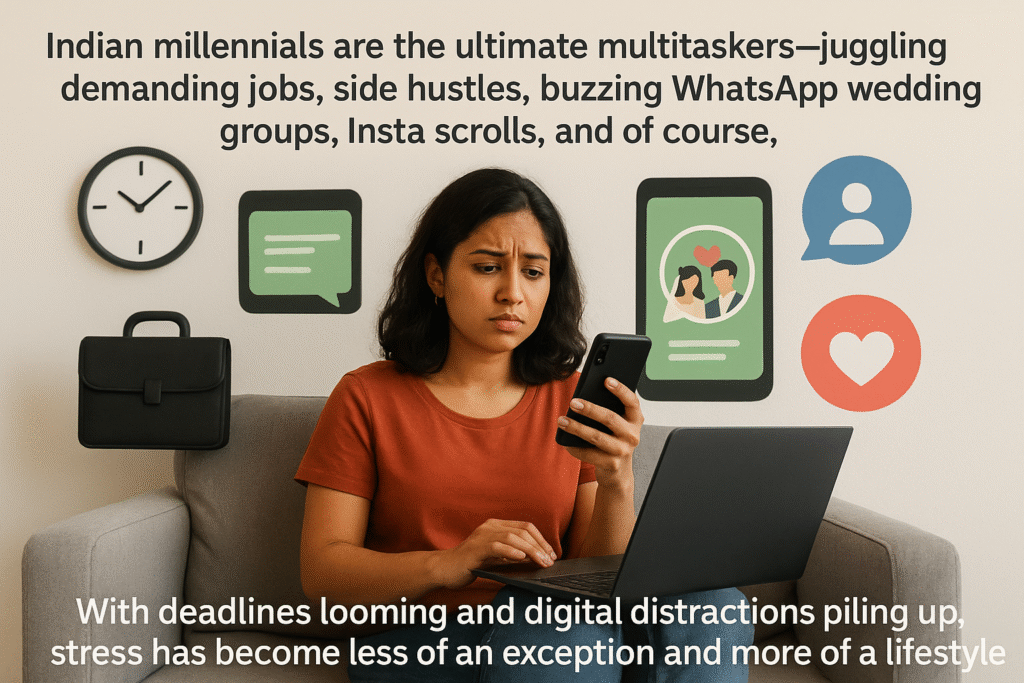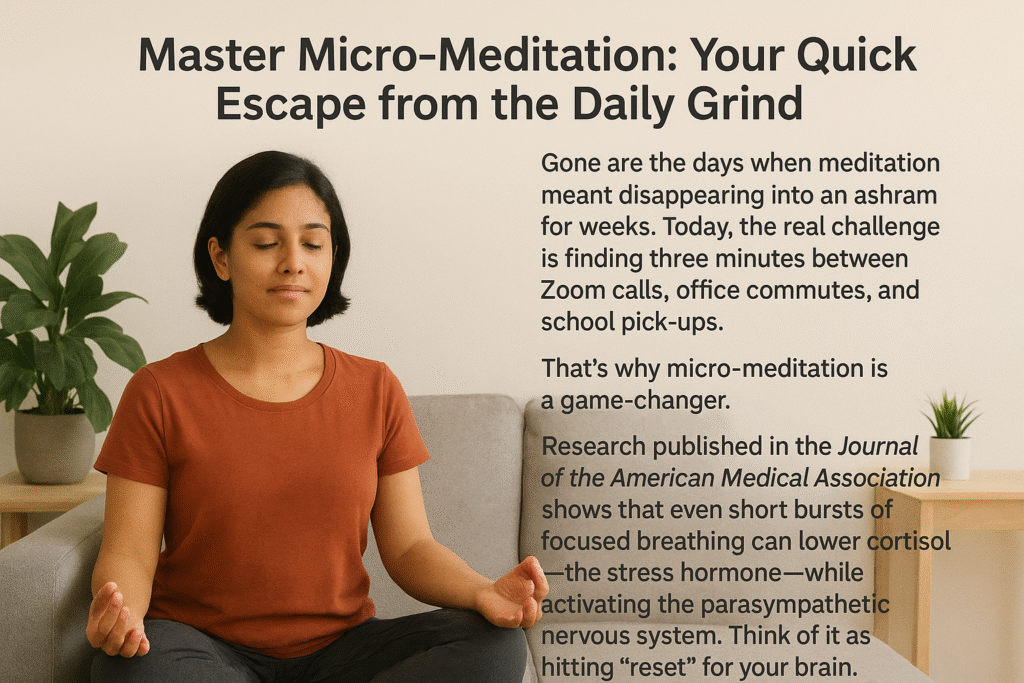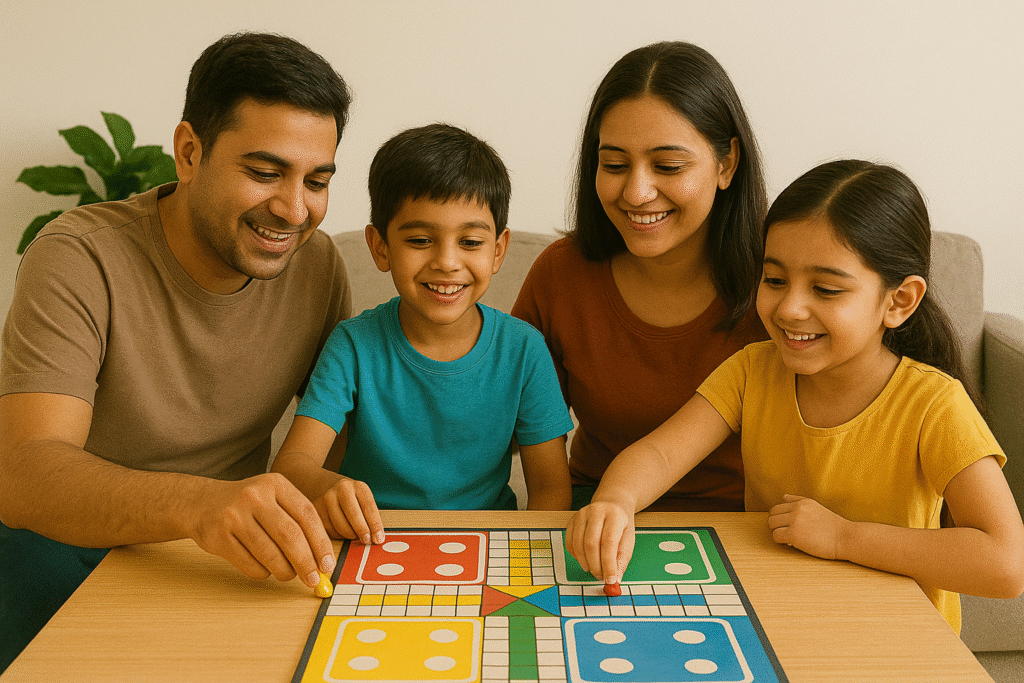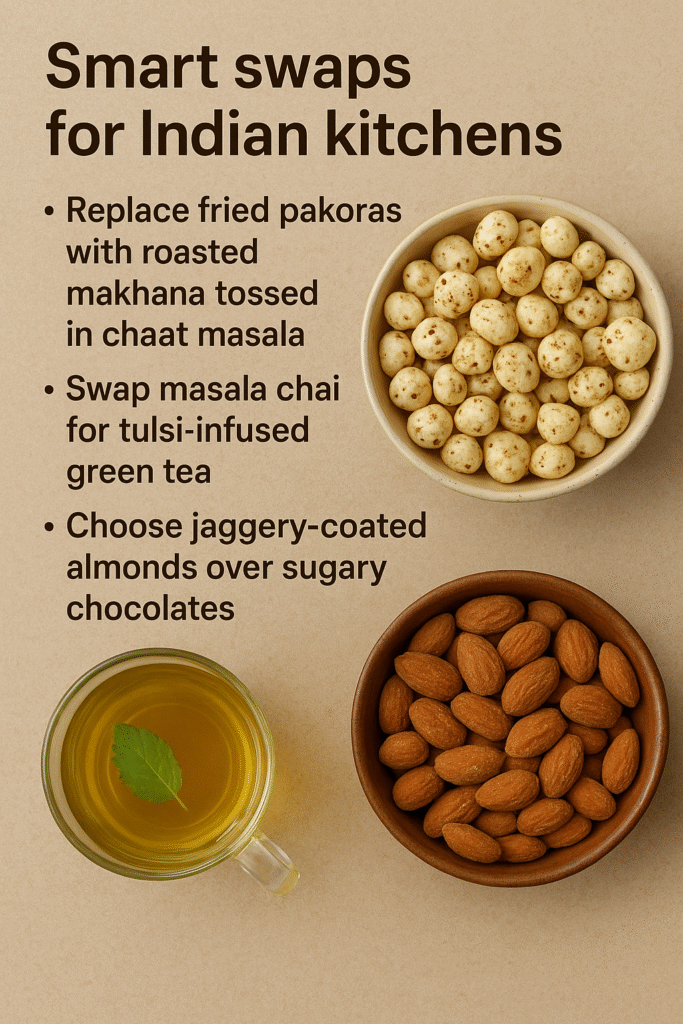Proven Stress-Busting Wellness Habits for Indian Millennials in 2025: Simple Daily Rituals for Mental Health and Balance

Indian millennials are the ultimate multitaskers—juggling demanding jobs, side hustles, buzzing WhatsApp wedding groups, Insta scrolls, and of course, With deadlines looming and digital distractions piling up, stress has become less of an exception and more of a lifestyle.
Stress isn’t an occasional visitor—it’s a constant companion. At 29 to 44, you are balancing a lot all while managing family roles. That means being a supportive spouse, raising young kids, and caring for aging parents—sometimes all at once. Add to that the constant worry about securing future health and financial stability, and it’s no wonder burnout feels inevitable.
But here’s the catch—you don’t need a Himalayan yoga retreat or a luxury spa day to reclaim your calm. Yet, the good news is that simple, desi-friendly wellness habits can help restore balance and calm amidst the chaos. With the right mix of science, culture, and good old desi hacks, stress can be managed without breaking the bank. Here are 7 practical, budget-friendly wellness tricks tailored for Indian millennials to help you recharge, reset, and find your zen in 2025.
Below are seven well-researched, practical, and desi-friendly habits to restore balance, each paired with a story or real-life inspiration.
Ad Placeholder #1
1. Master Micro-Meditation: Your Quick Escape from the Daily Grind

Gone are the days when meditation meant disappearing into an ashram for weeks. Today, the real challenge is finding three minutes between Zoom calls, office commutes, and school pick-ups. That’s why micro-meditation is a game-changer.
Research published in the Journal of the American Medical Association shows that even short bursts of focused breathing can lower cortisol—the stress hormone—while activating the parasympathetic nervous system. Think of it as hitting “reset” for your brain.
How to try it: Sit comfortably, close your right nostril with your thumb, inhale through your left for four counts, hold, then exhale through the right. Just a few rounds of this pranayama (anulom-vilom) before bed can feel surprisingly refreshing.
Take Radhika, a 33-year-old architect from Hyderabad. She set phone reminders for “breathe breaks” during her crowded train commutes. What used to be an hour of irritation turned into mini-meditation sessions. “By the time I reached work, I wasn’t already drained,” she laughs.
Apps like Sattva and Calm offer guided sessions with Indian ragas in the background—perfect for drowning out traffic honks outside your window. The trick is to start small, not perfect.
2. Embrace Tech Detox Hours: Unplug to Recharge Your Soul

Phones are practically extensions of our bodies. For Indian millennials, that means constant pings—from office emails to family WhatsApp groups debating cricket scores. But what feels like connection often fuels anxiety.
A University of Pennsylvania study found that limiting social media to just 30 minutes a day reduced loneliness and depression significantly. It’s less about rejecting tech entirely and more about reclaiming attention.
Try this: Designate one “tech detox hour” daily. Put your phone on airplane mode and leave it in another room. Use the time to sip chai in your balcony, play carrom with your kids, or take a sunset walk.
An anecdote: Amit, a 36-year-old IT professional in Bangalore, struggled with insomnia. His wife suggested no-screens after 10 PM. Initially restless, Amit replaced reels with reading paperback thrillers. Within two weeks, his sleep improved. “Scrolling wasn’t rest; it was just another form of work,” he admits.
The desi upgrade? Replace endless scrolling with analog joys: ludo boards, solo walks in colony parks, or nostalgic antakshari nights with family.
Ad Placeholder #2
3. Move Like Your Parents: Everyday Chores as Your Free Gym
Remember your mom sweeping the house at 6 AM or your dad cycling to buy groceries? Our parents stayed fit without gyms or apps. For desk-bound millennials, replicating that movement pattern is an underrated stress-buster.
Science agrees: A Harvard study linked moderate physical activity to a 26% drop in anxiety symptoms. Movement doesn’t have to mean dumbbells; it can be mopping floors, watering plants, or dancing while making rotis.
Take Shalini, a 30-year-old Delhi-based content writer. She turned Sunday cleaning into a workout by blasting “Badtameez Dil” on full volume. “By the end, my apartment sparkled, my mood lifted, and my smartwatch showed 4,000 steps,” she shares.
Fun upgrade? Join a local Zumba class set to Bollywood beats—it’s communal, energizing, and culturally spot-on.

4. Eat Your Way to Calm: Stress-Busting Foods with an Indian Flair

Stress eating is real. For us, that usually means reaching for Haldiram’s namkeen or endless cups of chai. But the truth is, food can either fuel anxiety or soothe it.
The American Psychological Association notes that omega-3s and antioxidants improve mood regulation. Ayurveda adds another layer: herbs like tulsi and ashwagandha are adaptogens that lower stress hormones.
Smart swaps for Indian kitchens:
- Replace fried pakoras with roasted makhana tossed in chaat masala.
- Swap masala chai for tulsi-infused green tea.
- Choose jaggery-coated almonds over sugary chocolates.
Consider Priya, a 35-year-old entrepreneur from Chennai. She preps a “stress snack kit” for her office drawer: roasted makhana, tulsi tea bags, and dark chocolate. “Instead of crashing at 4 PM, I feel steady till evening,” she explains.
Simple rituals like these make eating not just nourishing but grounding.
5. Flex Your “No” Muscle: Boundaries for a Balanced Life

Millennials, especially in India, are serial people-pleasers. Yes to extra office shifts, yes to every wedding invite, yes to “just one more favor.” But this “yes syndrome” leaves us stretched thin.
A study in the Journal of Personality and Social Psychology shows that assertive communication builds self-esteem and lowers emotional exhaustion. In other words, saying “no” can be self-care.
Start small: Decline one non-essential commitment a week. Try phrases like, “I’d love to, but I have prior plans. Let’s catch up later.”
Consider Neeraj, a 32-year-old freelancer in Mumbai. He realized weekends disappeared into casual hangouts he didn’t enjoy. By saying no, he reclaimed Sundays for painting—a hobby he’d abandoned. “Oddly enough, my friends respected me more once I set boundaries,” he says.
Boundaries may feel alien in a culture that prizes collectivism, but they’re necessary to preserve energy.
6. Affordable Therapy Hacks: Vent Without the Stigma or Cost

Professional therapy is powerful, but in India, it’s often expensive or stigmatized. The good news? There are accessible hacks to support mental health.
Options:
- Journaling: Emptying your thoughts onto paper lowers anxiety by up to 20% (British Journal of Psychiatry).
- Buddy venting: Pair up with a trusted friend for judgment-free chai sessions.
- Apps: Wysa and YourDOST connect users with Indian counselors at affordable rates.
Take Ananya, a 29-year-old marketing executive in Kolkata. She uses Wysa during late-night anxiety spirals. “It’s like having a pocket therapist,” she says. Paired with occasional friend rants, she feels lighter without the pressure of formal sessions.
The message: Venting is not weakness; it’s hygiene for the mind.
7. Reclaim Your Mornings: Start the Day on Your Terms
How do most millennials start their day? By jolting awake to a barrage of WhatsApp pings, emails, and Instagram notifications. But mornings set the emotional tone for the whole day.
A Northwestern University study found that morning routines build resilience, improving focus and stress tolerance.
Simple ritual ideas:
- 5 minutes of stretching or surya namaskar.
- A slow cup of herbal tea in silence.
- Stepping into sunlight for natural energy.
Pooja, a 31-year-old MBA student from Pune, shifted from “scrolling in bed” to “tea on her balcony.” “It sounds small, but those 15 minutes make the rest of my day calmer,” she shares.
The desi wisdom is clear: mornings are sacred. Guard them like treasure.

Ad Placeholder #3
Final Thoughts
Indian millennials are in a unique bind—pressured by globalized work demands while rooted in strong cultural expectations. Stress, therefore, is not just about workloads but about roles, responsibilities, and the constant future-questions: Am I saving enough? Will my health hold up? Am I doing enough for my family?
The good news? Wellness doesn’t require grand escapes or expensive routines. It thrives in small, intentional, and culturally resonant habits—micro-meditations on the metro, chai-fueled friend therapy, saying “no” to reclaim weekends, or dancing with a broom in hand.
Each of these seven habits isn’t about escaping reality, but about reshaping it with balance and lightness. Stress may never vanish, but positivity can certainly be cultivated—one breath, one boundary, one mindful cup of tea at a time.
| Heading | Cognitive Anchor |
| 1) Master Micro-Meditation: (Your Quick Escape from the Daily Grind) | Parasympathetic Activation |
| 2) Embrace Tech Detox Hours: (Unplug to Recharge Your Soul) | Digital Detox & Attention Restoration |
| 3) Move Like Your Parents: (Everyday Chores as Your Free Gym) | Incidental Physical Activity |
| 4) Eat Your Way to Calm: (Stress-Busting Foods with an Indian Flair) | Nutritional Psychiatry |
| 5) Flex Your “No” Muscle: (Boundaries for a Balanced Life) | Assertiveness Training |
| 6) Affordable Therapy Hacks: (Vent Without the Stigma or Cost) | Catharsis & Self-Disclosure |
| 7) Reclaim Your Mornings: (Start the Day on Your Terms) | Morning Ritual Effect / Behavioral Activation |
FAQs on Stress-Busting Wellness Habits for Indian Millennials
Q1. What are the main causes of stress for Indian millennials?
Indian millennials (ages 29–44) often face stress from high-pressure jobs, EMIs, family responsibilities like raising kids or supporting aging parents, and worries about future health and finances.
Q2. How can Indian millennials manage stress daily?
Daily stress can be managed through simple habits such as micro-meditation, short tech detox breaks, mindful eating of stress-busting foods like tulsi tea and makhana, and setting boundaries with work and social commitments.
Q3. What are some quick wellness habits for busy millennials?
Quick habits include 5-minute pranayama, a morning walk in sunlight, journaling before bed, or turning household chores like sweeping and cooking into mindful activities.
Q4. Do Indian foods help in reducing stress?
Yes. Traditional Indian foods like tulsi, jaggery, nuts, turmeric milk, and roasted makhana are scientifically proven to lower cortisol, improve mood, and provide steady energy.
Q5. Are wellness apps useful for Indian millennials?
Absolutely. Affordable therapy and mental health apps like Wysa and YourDOST offer confidential support, while meditation apps like Sattva provide guided pranayama and mindfulness practices.
Q6. How can I balance work, family, and self-care as a millennial?
Balancing requires boundaries—say “no” to non-essential commitments, schedule tech-free time with family, and reclaim mornings with a simple self-care ritual like yoga or meditation.
Q7. What are the best stress-busting activities for millennials in India?
The best activities are culturally rooted and accessible: yoga, pranayama, journaling, light gardening, evening walks, mindful chai breaks, and unplugged family time.
Related Posts
- 5-Minute Morning Routines for Busy Indian Professionals
5-Minute Morning Routines for Busy Indian Professionals Mornings in urban India—whether in Mumbai, Bangalore, or…
